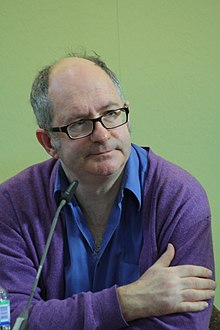John Lanchester
Appearance

John Henry Lanchester (born 25 February 1962) is a British journalist, novelist and a contributor to the London Review of Books.
| This article about a journalist is a stub. You can help out with Wikiquote by expanding it! |
Quotes
[edit]- The internet is the most effective means of giving stuff away for free that humanity has ever devised. Actually making money from it is not just hard, it may be fundamentally opposed to the character and momentum of the net. And yet this is where the newspaper business now is.
- John Lanchester "Let Us Pay" London Review of Books (16 December 2010)
- We are more connected in more ways to more people than we ever have been at any point in human history. This is changing everything, and it would be deeply strange if it didn’t change money too.
- "When Bitcoin Grows Up", The London Review of Books (April 21, 2016)
- You can trust that the phone is the property of the person who owns it, because the combination of sim card technology and pin numbers is very strong. Behind the user-friendly façade of chip and pin are cryptographic techniques of industrial strength. Indeed, the pin number technology used in cashpoint machines initially evolved as a question and response protocol to confirm nuclear weapon access codes. You can trust that this person who owns the phone is who they say they are: that basic act of trust is fundamental to the operation of all money systems.
- When Bitcoin Grows Up, London Review of Books (21 April 2016).
- Science and technology: we tend to think of them as siblings, perhaps even as twins, as parts of stem (for “science, technology, engineering, and mathematics”). When it comes to the shiniest wonders of the modern world—as the supercomputers in our pockets communicate with satellites—science and technology are indeed hand in glove. For much of human history, though, technology had nothing to do with science. Many of our most significant inventions are pure tools, with no scientific method behind them. Wheels and wells, cranks and mills and gears and ships’ masts, clocks and rudders and crop rotation: all have been crucial to human and economic development, and none historically had any connection with what we think of today as science. Some of the most important things we use every day were invented long before the adoption of the scientific method.
- "The Case Against Civilization", The New Yorker (18 September 2017).
- Soap prevented more deaths than penicillin. That’s technology, not science.
- "The Case Against Civilization", The New Yorker (18 September 2017).
External links
[edit]- Links to articles available online by John Lanchester in the London Review of Books.
- Lanchester's articles on The New Yorker.
- Whoops Video presentation on YouTube.

